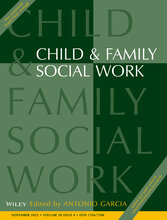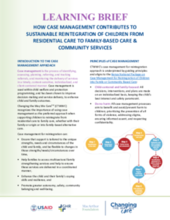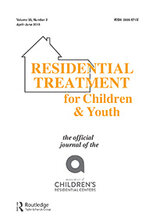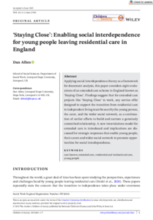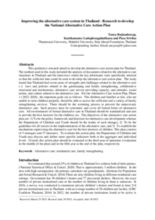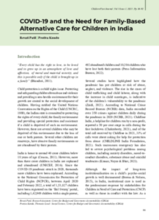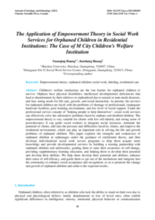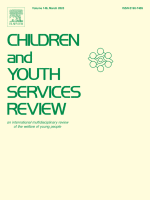Displaying 61 - 70 of 1510
The study's main themes were establishing the need for residential homes for children (RHCs), RHCs not being an ideal family environment and RHCs as respite. Family marital problems, poor financial situation, stigma attached to some children in care, abusive parents and a lack of suitable alternatives when families have a crisis were identified as key factors that impede DI implementation in Ghana.
This learning brief reports on the reflection and shares a collection of case studies collated by caseworkers in Kenya. Using Most Significant Change Storytelling, the caseworkers, supervisors and program managers selected and discussed stories from their work. They discussed what lessons these stories and the discussion drew out about the case management practice. The each of the stories illustrates one or more of the case management steps.
This qualitative study explores the prevalence and role of natural mentors in the lives of unaccompanied immigrant youth residing in the Barcelona Metropolitan Area. The authors' findings suggest that natural mentors provide various types of social support and social capital, which fulfil the emotional or educational needs of young people.
This paper considers eight evaluations of an extended care scheme in England known as ‘Staying Close’. Findings suggest that for extended care projects like ‘Staying Close’ to work, any service offer designed to support the transition from residential care to independent living must be seen by the young person, the carer, and the wider social network, as a continuation of earlier efforts to build and nurture a genuinely committed relationship.
This qualitative research aimed to develop the alternative care action plan for Thailand. The method used in this study included the analysis of documents related to the alternative care situations in Thailand and the interviews where the key informants were specifically selected so that the collected data could be used to develop the alternative care action plan.
This U.S.-based study explored youth experiences in residential care at different stages of adolescence.
Providing a safe and non-hostile environment for growth is every child's right. Need of Care and Protection (CNCP) and those in conflict with the law. This article discusses the limitations of institutional care and why there is a need to shift focus to Family-Based Alternative Care services (FBAC), especially in the context of COVID-19.
The aim of this child-centered project is to provide the opportunity for children who have experienced hostile environments and inappropriate care to become aware of, regulate, and express their inner socio-emotional world via tactile and visual experimentation with eMoBo so that they might more easily communicate their feelings and needs with non-biological caregivers, striving for a significant, long-standing improvement in the wellbeing of these children. In this paper, the authors present our designs and envision their use in two use cases.
This paper explores the strengths and weaknesses of orphaned children in orphanages in China under the guidance of enrichment theory, and then develops individualized social work service programs to help them acquire more knowledge and provide developmental services by building a trusting partnership with orphaned children and adolescents, guiding them to raise their awareness of self-change, providing supplementary learning education, and helping them to develop their potential and develop their abilities.
This US-based study draws from a large-scale, quasi-experimental study of group homes in a southeastern state. To date this is the study examining youth’s prospective assessment of group home treatment quality on their later treatment outcomes.

